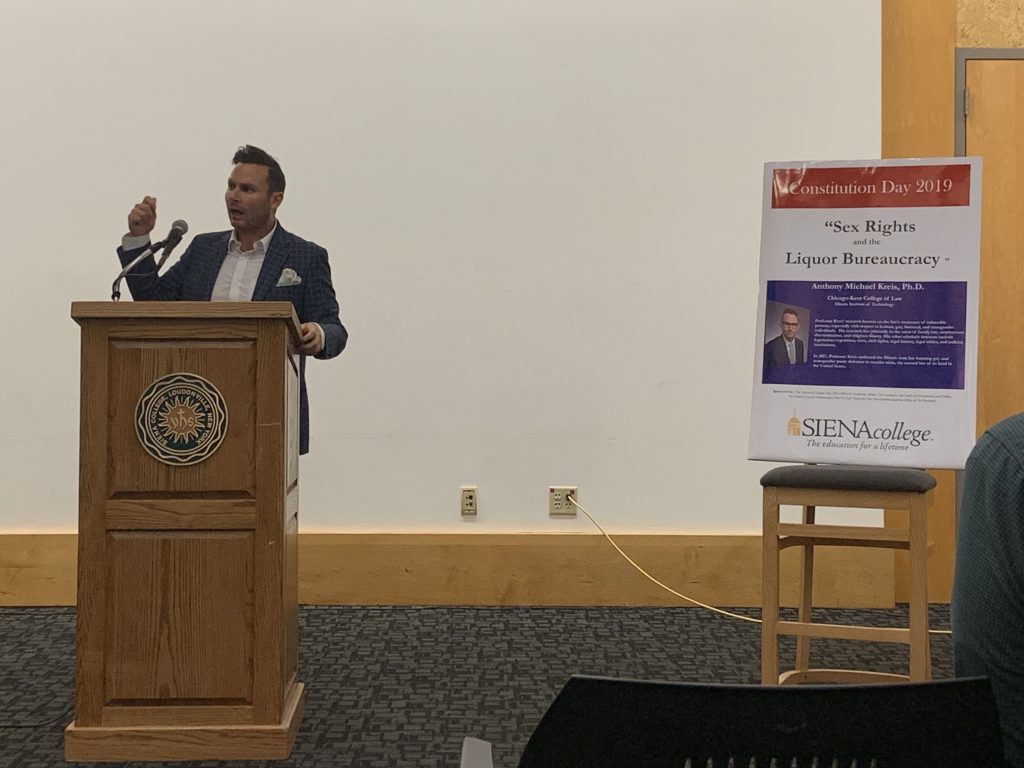
On Monday, September 23rd, the Siena community came out to attend “Constitution Day 2019: Sex Rights and the Liquor of Bureaucracy” featuring guest lecturer, Dr. Anthony Michael Kreis. A national holiday, Constitution Day exists to commemorate the signing of the Constitution in September, 1787. Here on campus, Constitution Day serves as an annual opportunity to discuss a relevant concern regarding constitutional law. This year’s Constitution Day took on a question that has been recently creating turmoil in American legislation: who really is protected under Title VII of the Civil Rights Act of 1964?
The discussion was opened by Professor of Political Science, Dr. Leonard Cutler. Dr. Cutler elaborated on the relevance of this year’s theme, “A few weeks ago, the Trump administration took it’s staunchest position to date in legalizing anti-gay discrimination..” he continued “..when it asked the supreme court of the United States to declare that Title VII of the Civil Rights Act permits private companies to fire workers based on their sexual orientation.”
Title VII of the Civil Rights Act outlaws discrimination based on race, color, religion, sex, or national origin. As explained by Dr. Cutler, the current presidential administration has taken on the stance that members of the LGBTQ community are not protected under Title VII in regards to private employers discriminatory practices. Following Dr. Cutler was Professor of Political Science, Dr. Jack Collens. Dr. Kreis and Dr. Collens attended graduate school together at the University of Georgia and after sharing his accolades with the crowd, it was time for Dr. Collens to invite Dr. Kreis to the stage.
Dr. Anthony Michael Kreis currently teaches legal writing at Chicago-Kent College of Law. He authored the Illinois state law banning gay and transgender panic defenses in murder trials in 2017, which is the second of its kind in the U.S. Dr. Kreis opened by discussing how the accidental discovery of gay and lesbian bars during the Prohibition era sparked an ongoing dispute of the LGBTQ, immigrant, and working class communities versus American law-makers and private groups that wanted to maintain the social norms of pre-Industrial Revolution times.
“If you had too many feminine men in your bar, they deemed it a place of disorderly conduct. And they put pressure on wholesalers to deny those establishments of liquor” Kreis stated. “In the 1940’s, 50’s, and 60’s the state said ‘If we see too many feminine men in a bar, we’re assuming it’s a gay bar and we’re shutting it down” he said about the determination if establishments could remain open post-prohibition. Basically, the battle between the LGBTQ community and American law-makers has been occurring for over a century.
At this point in the lecture, the question still remained, what does all of this mean for today’s concerns surrounding a new interpretation of Title VII? “The idea here is that you cannot discriminate against someone because of their sexual orientation without also discriminating against them because of their sex.” He elaborated that the stereotypes surrounding gender roles used by employers to justify discriminatory practices against LGTBQ employees directly plays into sex discrimination.
Dr. Kreis closed out his discussion by stating “Title VII is ultimately supposed to reflect our constitutional values and the law has been shaped by an understanding that sex stereotypes are dangerous..” Following the lecture, Dr. Kreis opened the floor for Q&A and soon after, Constitution Day 2019 came to an end. After all was said and done, attendees walked away from the event with a greater understanding on a topic that Dr. Kreis referred to as, currently, “the greatest civil rights case of our time.”